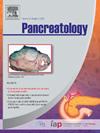一项孟德尔随机研究调查了辛伐他汀对胰腺炎风险的因果影响。
IF 2.7
2区 医学
Q2 GASTROENTEROLOGY & HEPATOLOGY
引用次数: 0
摘要
背景:辛伐他汀与胰腺炎的关联并不一致。我们采用孟德尔随机化(MR)作为途径来确定辛伐他汀摄入量与胰腺炎发病可能性之间的潜在因果关系。方法:利用UK Biobank进行基因变异定位。与辛伐他汀有关。关于急性(AP)和慢性(CP)胰腺炎的信息已经从欧洲血统、FinnGen联盟和东亚人群中获得。进行了单变量和多变量磁共振分析。结果:在欧洲人群中,逆方差加权(IVW)分析显示辛伐他汀的使用与急性胰腺炎(AP, P = 0.129)或慢性胰腺炎(CP, P = 0.430)之间没有显著的因果关系。在使用MR-Egger、加权中位数和留一(LOO)方法的敏感性分析中观察到一致的零效应。针对酒精使用和胆石症调整的多变量MR同样显示没有直接影响(AP: P = 0.744;Cp: p = 0.183)。使用FinnGen Consortium的GWAS数据进行复制分析(IVW: AP P = 0.070;CP P = 0.939)和东亚队列(IVW: AP P = 0.325;CP = 0.907)证实了这些模式。所有敏感性方法(MR-Egger/加权中位数/LOO)在各队列中得出一致的结果。经混杂因素调整后,多变量磁共振结果与主要结果保持一致。结论:遗传证据尚未证明辛伐他汀与胰腺炎之间存在因果关系,提示常规监测可能不必要。本文章由计算机程序翻译,如有差异,请以英文原文为准。
A Mendelian randomization study investigating the causal effect of simvastatin consumption on pancreatitis risk
Background
Simvastatin has been inconsistently linked to pancreatitis. We employed Mendelian Randomization (MR) as a pathway to ascertain this potential causal connection among simvastatin consumption and likelihood of pancreatitis onset.
Methods
UK Biobank was employed to pinpoint genetic variations. Related to simvastatin. Information on acute (AP) and chronic (CP) pancreatitis has been obtained from the European ancestry, FinnGen consortium, and East Asian people. Univariate and multivariate MR analyses have been performed.
Results
In European populations, inverse variance weighted (IVW) analysis revealed no significant causal association between simvastatin use and acute pancreatitis (AP, P = 0.129) or chronic pancreatitis (CP, P = 0.430). Consistent null effects were observed across sensitivity analyses using MR-Egger, weighted median, and leave-one-out (LOO) methods. Multivariable MR adjusted for alcohol use and cholelithiasis similarly showed no direct effects (AP: P = 0.744; CP: P = 0.183). Replication analyses using GWAS data from FinnGen Consortium (IVW: AP P = 0.070; CP P = 0.939) and East Asian cohorts (IVW: AP P = 0.325; CP P = 0.907) confirmed these patterns. All sensitivity methods (MR-Egger/weighted median/LOO) yielded concordant results across cohorts. Multivariable MR outcomes remained aligned with primary findings after confounder adjustment.
Conclusions
Genetic evidence has not proven a causality between simvastatin and pancreatitis, suggesting that routine monitoring may be unnecessary.
求助全文
通过发布文献求助,成功后即可免费获取论文全文。
去求助
来源期刊

Pancreatology
医学-胃肠肝病学
CiteScore
7.20
自引率
5.60%
发文量
194
审稿时长
44 days
期刊介绍:
Pancreatology is the official journal of the International Association of Pancreatology (IAP), the European Pancreatic Club (EPC) and several national societies and study groups around the world. Dedicated to the understanding and treatment of exocrine as well as endocrine pancreatic disease, this multidisciplinary periodical publishes original basic, translational and clinical pancreatic research from a range of fields including gastroenterology, oncology, surgery, pharmacology, cellular and molecular biology as well as endocrinology, immunology and epidemiology. Readers can expect to gain new insights into pancreatic physiology and into the pathogenesis, diagnosis, therapeutic approaches and prognosis of pancreatic diseases. The journal features original articles, case reports, consensus guidelines and topical, cutting edge reviews, thus representing a source of valuable, novel information for clinical and basic researchers alike.
 求助内容:
求助内容: 应助结果提醒方式:
应助结果提醒方式:


